Interfaith Alliance Promotes Clean Water and Sanitation
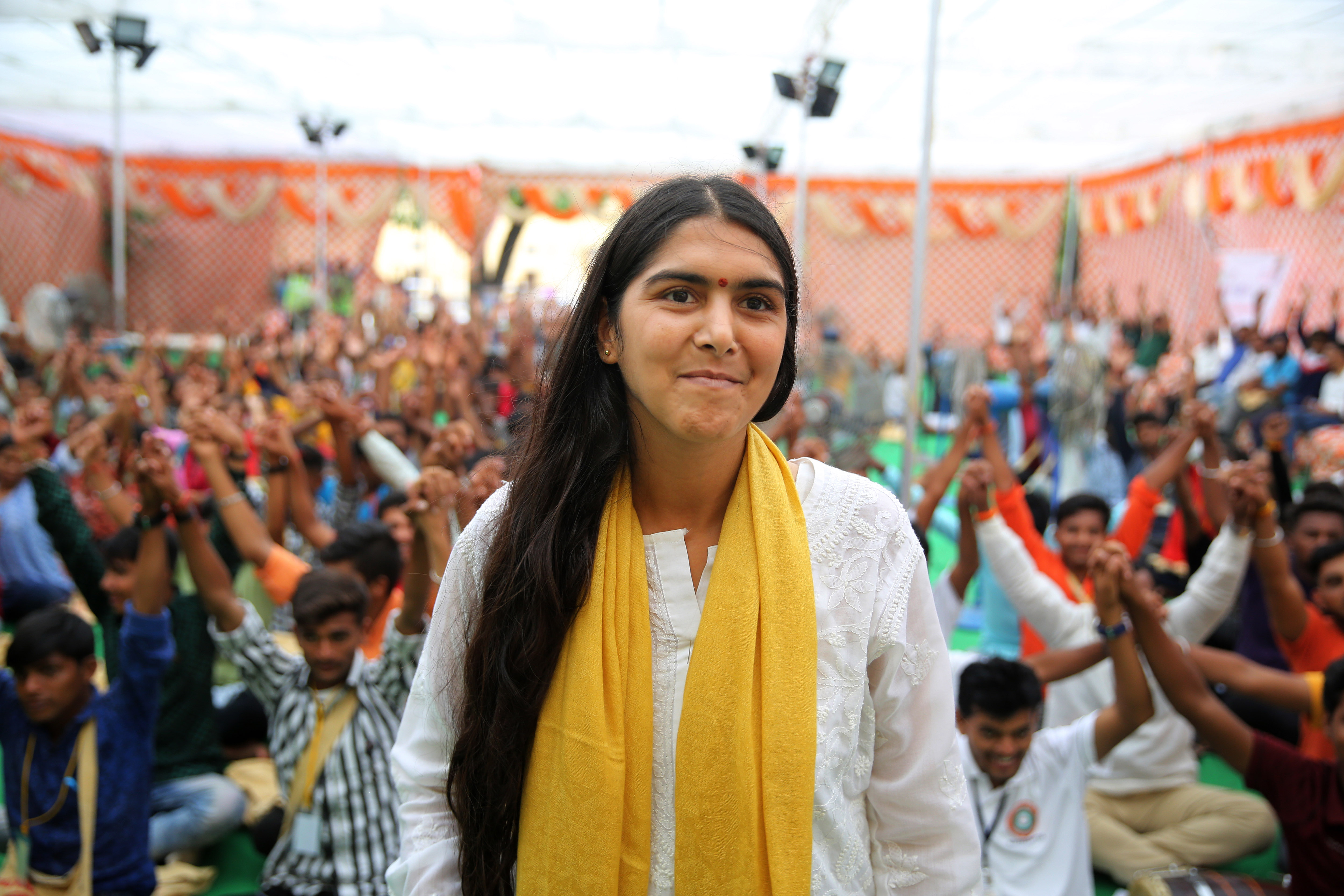
At 22, disenchanted with life in the United States and seeking to reconnect with her Indian roots, Nandini Tripathi embarked on a spiritual journey to picturesque Rishikesh where the Ganges River (Ganga) emerges pristine from the Himalayan Mountains.
Her visit to this world-famous yoga haven was supposed to be temporary, a way to reflect and reset before starting medical school or whatever obligation beckoned next, but Ganga had other plans.
“I felt a deep energetic connection with the river. It was more than just a flowing body of water. It felt like I had come home,” Nandini said of her first moments along Ganga’s banks.
She felt a similar connection to His Holiness Pujya Swami Chidanand Saraswatiji, President of Parmarth Niketan Ashram in Rishikesh, and to his vision for protecting Ganga, a vital source of physical and spiritual sustenance for hundreds of millions of Indians that gets heavily polluted downstream.
“His vision encompassed environmental, scientific, agricultural, cultural, and spiritual concerns, a vision that would help Ganga survive and remain a source of inspiration,” Nandini remembers of her first interaction with Pujya Swami. “When he asked for help conserving Ganga, I immediately raised my hand. I thought it would be a few months’ internship. I didn’t anticipate a lifetime of service.”
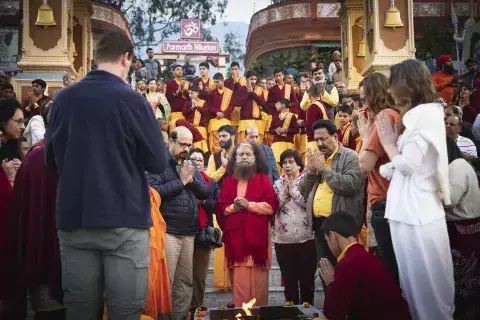
Nine years later, Nandini still lives at Parmarth Niketan Ashram in Rishikesh where she serves as director of programme implementation, integration, and communication for the Global Interfaith Water, Sanitation & Hygiene (WASH) Alliance (GIWA) and as project coordinator for Ganga Action Parivar.
GIWA collaborates with spiritual leaders and civil society from around the world to improve standards of drinking water, sanitation, and hygiene, provide disaster relief services, and promote river conservation and environmental preservation. Nandini works tirelessly bringing Bahá’í, Buddhist, Christian, Hindu, Jain, Muslim and Sikh communities together in dialogue to advance these goals.
“Religious leaders play a critical role in addressing seemingly intractable problems like access to safe water and sanitation. These things affect us all, so it’s no surprise that interfaith dialogue and harmony has flowed from this work,” she said.
Among GIWA’s biggest priorities in recent years have been to end open defecation and promote sanitary toilet use in India.
“When we started this work, it was unheard of to use faith platforms to talk about toilets. GIWA spreads the message that just like temples keep our thoughts clean, toilets keep our bodies clean,” Nandini said. “The government made millions of toilets available in its Open Defecation Free (ODF) campaign, but people were not using them. Getting faith leaders to talk about these issues inspired sustainable behavioural change in ways that infrastructural provisions on their own never could.”
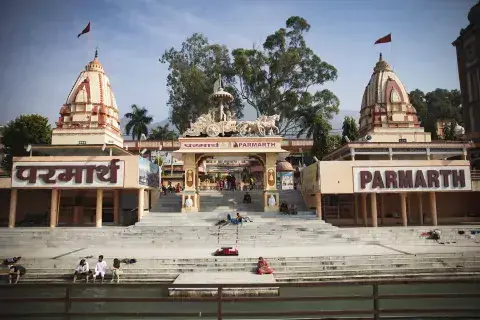
GIWA’s advocacy and education campaigns have been bold, but they’ve also been playful. At the recent Prayagraj Kumbh Mela, a pilgrimage and festival where up to 150 million Hindus gather to bathe in sacred waters, GIWA set up a toilet park and eco-friendly café where visitors could sit and drink tea atop decorative toilet seats.
“People would go to temples, take a holy dip, and then come take selfies and hang out at our toilet café,” Nandini said. “It was a huge success. We lined the walls with different toilet technologies so people could see how to improve sanitation in their communities and be inspired to live more sustainably.”
GIWA’s Secretariat Parmarth Niketan Ashram is leading by example, using some of these technologies to treat and reuse their grey water for gardening and other daily needs.
“The most revered pilgrimage sites in the Himalayan state are located near us at Ganga’s and her tributaries’ origins. We want to utilise faith as a medium to inspire people to make green pilgrimages and be more aware and conscious of their impact on these spaces,” Nandini explained.
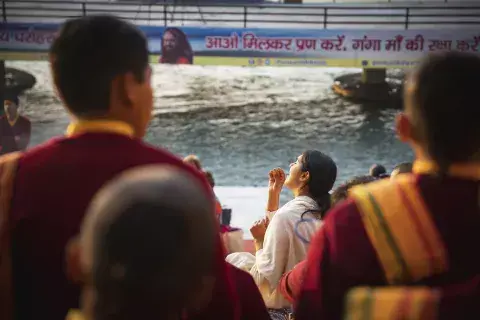
GIWA also leads educational programmes to inspire young people of different faiths to be ambassadors for water conservation and women empowerment programmes that go beyond WASH to promote girl’s education and menstrual hygiene management and to oppose child marriage.
“These things are all interwoven and interlinked. Women are the most affected by water crises and often face other obstacles that prevent them from seeking improved WASH. Our Women for WASH programme empowers women to be the change they wish to see in their communities,” Nandini said.
Closely related to GIWA is Nandini’s service with Ganga Action Parivar (GAP), a network of engineers, scientists, activists, spiritual leaders, environmental specialists and volunteers who work to restore and protect Ganga and its tributaries in their free-flowing natural state.
Businesses along Ganga’s banks contribute heavily to its pollution, as do individuals discarding waste and washing clothes using environmentally unfriendly detergent. GAP is working to ban industries from dumping toxic effluents in Ganga and pushing for legislation that would protect the river’s right to flow as a living entity, similar to how human rights protect people.
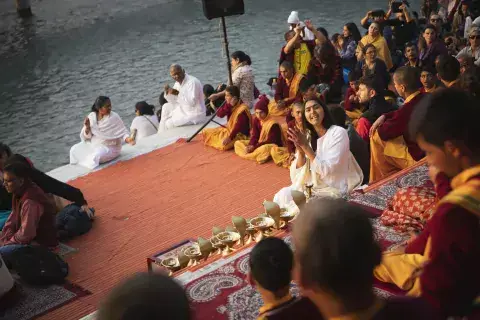
“Ganga’s flow and the flow of India’s progress are linked,” Nandini said. “GAP’s founder and my Guru H.H. Pujya Swami often says that if Ganga dies, India dies, and if Ganga thrives, India thrives.”
With droughts and floods crippling major cities and threatening much of India’s population, GIWA and GAP are rejuvenating rivers and reframing waste as wealth to promote sustainable development. GIWA is also planning to work with faith leaders in Nigeria to address humanitarian and environmental crises there, using interfaith dialogue to break down tensions and misperceptions. These tools help participants recognise their common humanity.
“Harmony and interreligious dialogue are like the river’s flow,” Nandini said. “Discrimination, stereotypes, and our limited understanding of the other pollutes and diverts harmony. We need to connect with our common humanity and celebrate its rich diversity for harmony to flow freely.”
Since arriving in Rishikesh nearly a decade ago, Nandini has embraced Karma Yoga, expanding her practice “off the mat and into the world” to selflessly serve others. This transformation has deepened her association with Hinduism, India, and Ganga in ways she never expected.
“This work has shown me how to respect the environment and other faiths and to live and exist in harmony with all of creation. It’s shown me that the world is one family and that we can be vessels and instruments of service. Clearly the divine has a bigger plan for me, and I’ve decided to go with that flow.”
Nandini Tripathi is one of KAICIID's featured Heroes of Dialogue. To find out more, click here
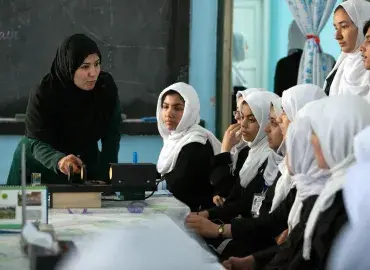
A failure to include the voices of Afghan women in the current peace…
